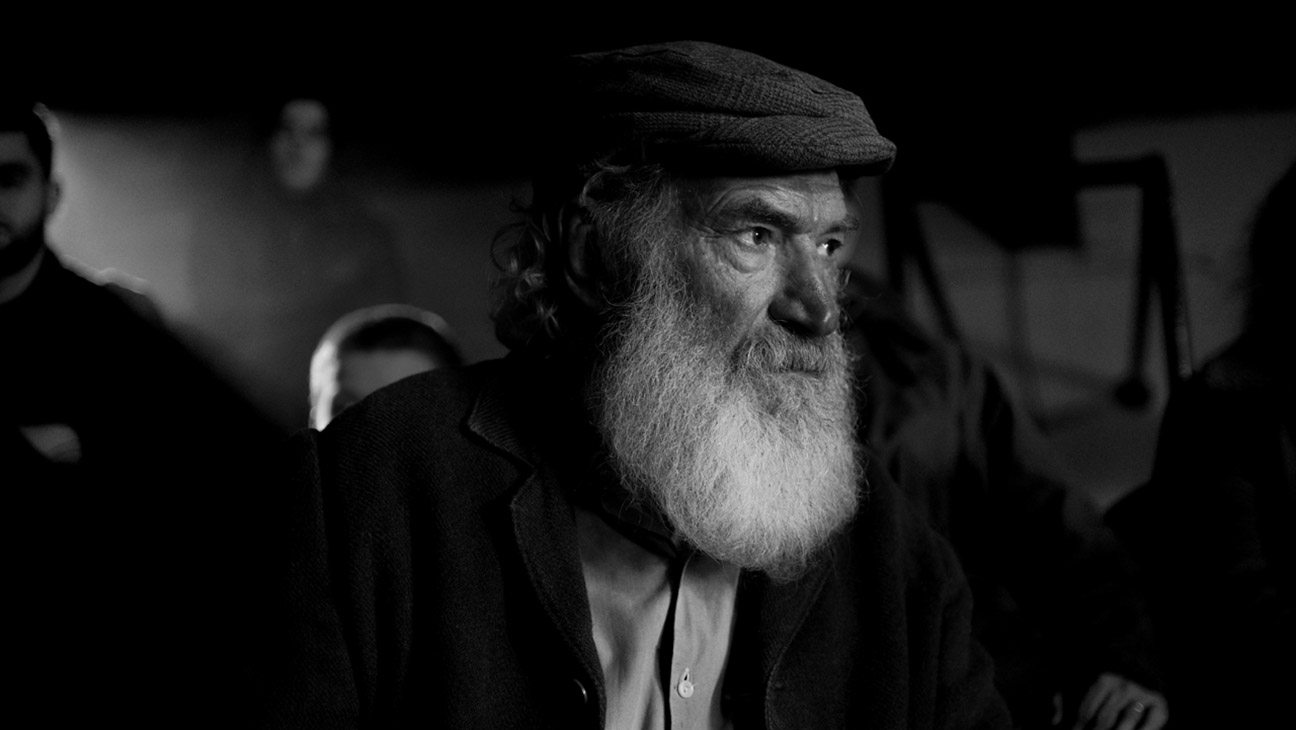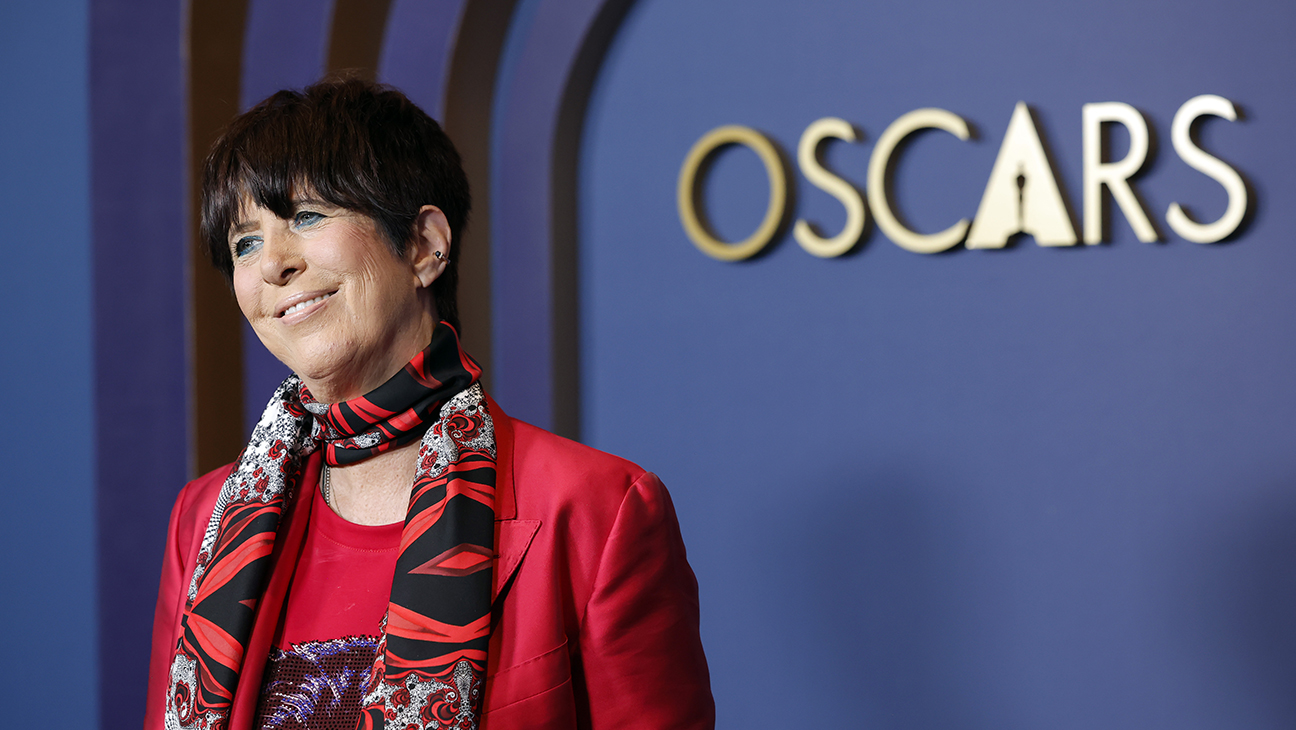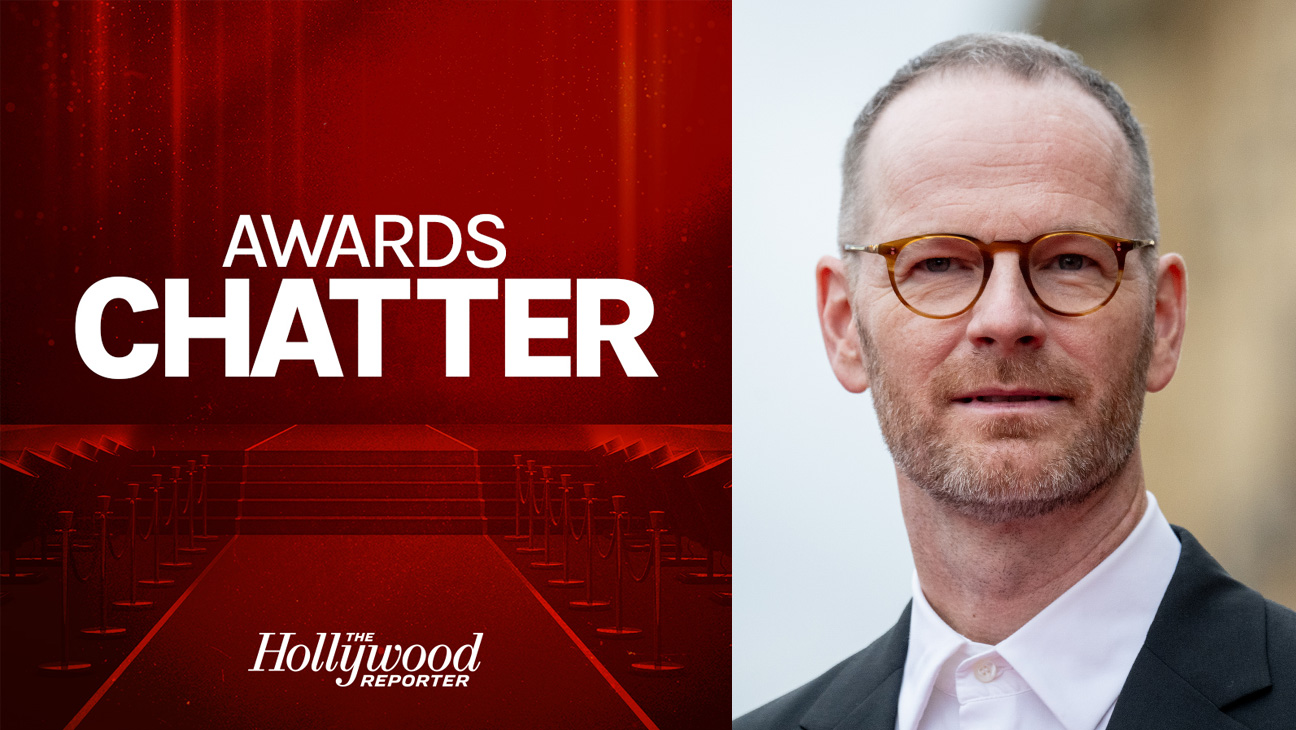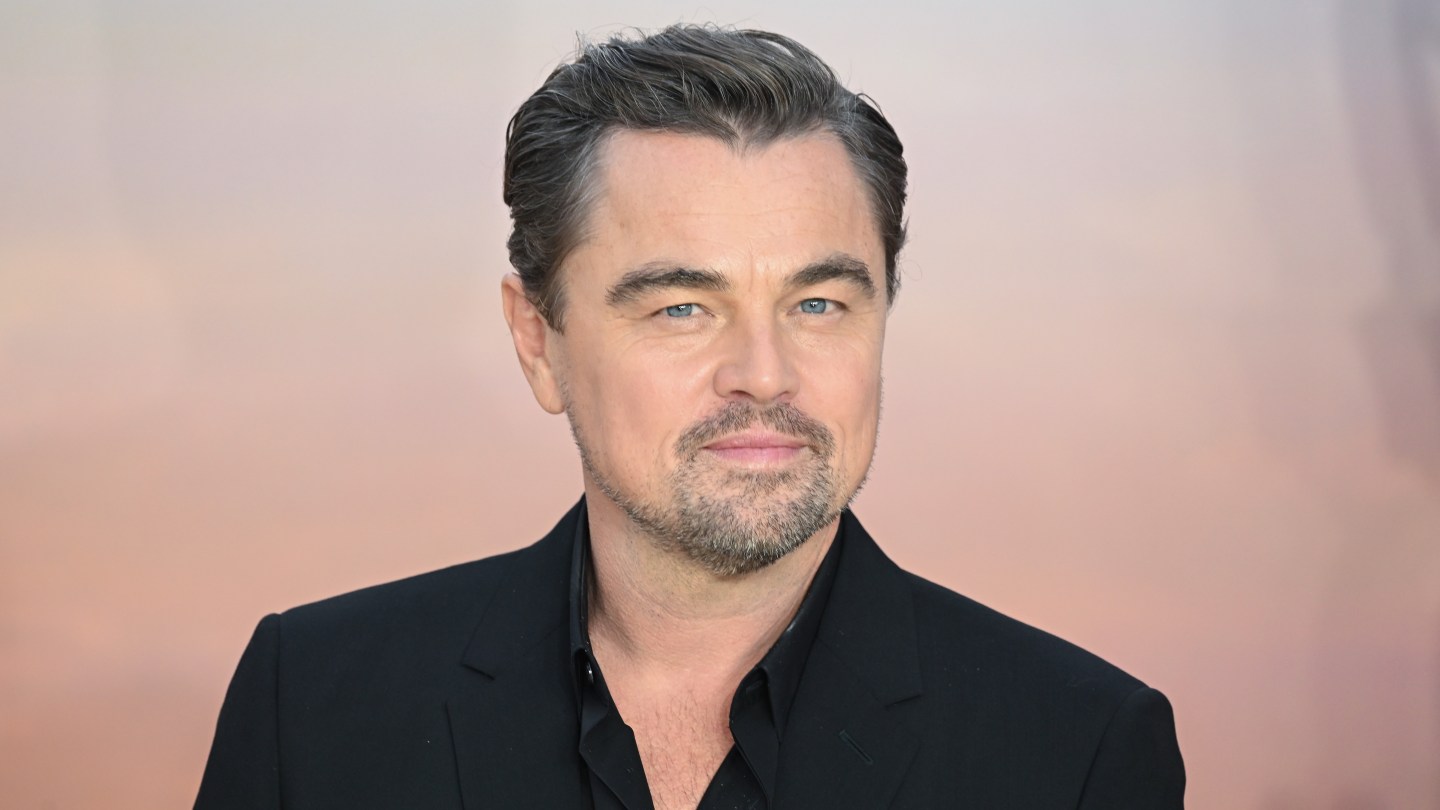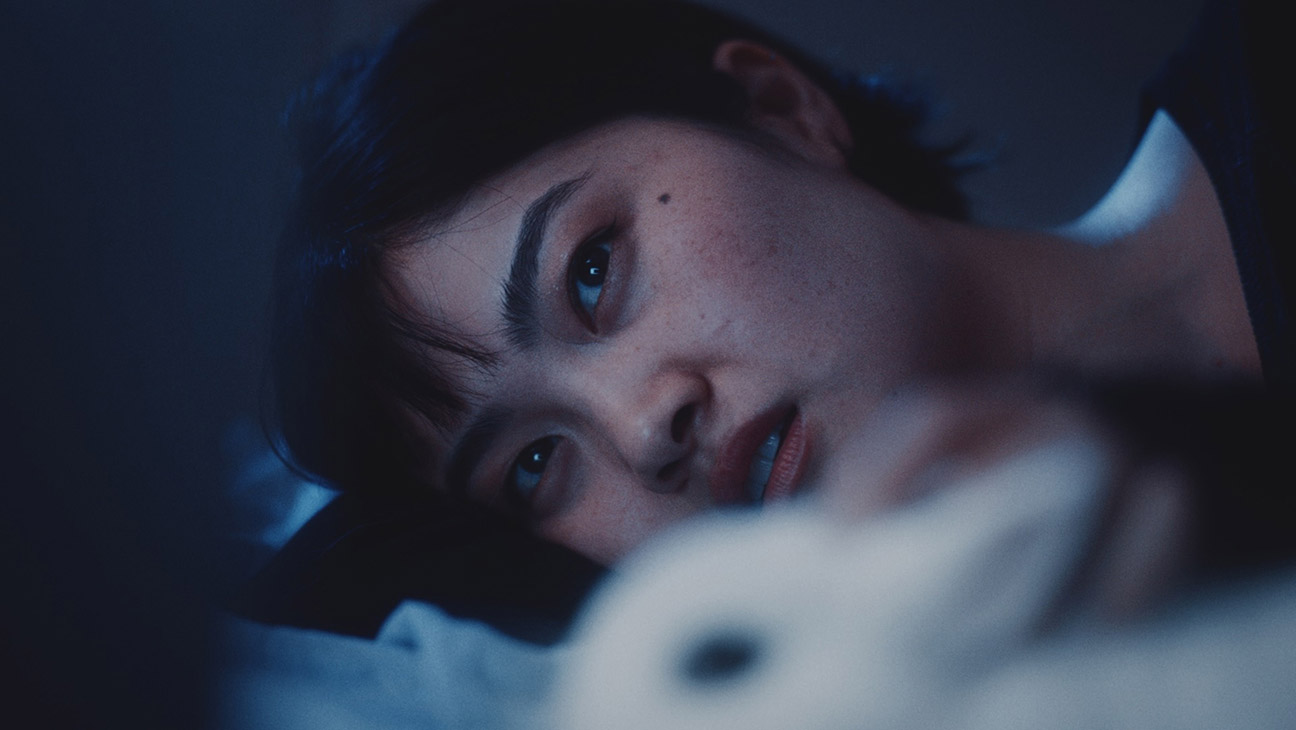Writer-director Mac Nixon knows that you have sheep and lush green landscapes in mind when thinking about Wales. That’s why he plays with these tropes in his 20-minute black-and-white short Flock, which world premieres at the 69th edition of the BFI London Film Festival (LFF) with other shorts grouped together under the theme “Pulling the Rug Out.”
The English- and Welsh-language Flock, co-written by Daley Nixon, was selected as part of Film4 and the BFI’s Future Takes initiative. In addition to production funding, BFI and Film4 creative and production executives support each film picked through its entire lifecycle. Once completed, the films are screened at a showcase, after which they become available for streaming on Channel 4 platforms and the BFI Player.
Get ready to see your romanticized views of Wales shattered in the short starring Kenton Lloyd-Morgan as The Shepherd, Eiry Thomas as The Farmer, and Fflyn Edwards as The Farmhand. “The violence of mob mentality is unleashed when a remote farming community’s entire sheep population suddenly vanishes,” reads a synopsis.
Flock is one of four Film4 shorts at the LFF and was supported and funded by Future Takes, a joint initiative from the BFI and Channel 4’s Film4, whose creative and production executives support each film through its entire lifecycle.
Said Farhana Bhula, director of Film4: “We are thrilled that four shorts, backed by Film4, will be premiering at this year’s London Film Festival.” Added Alice Cabanas, head of BFI Network: “We are delighted to see the positive impact Future Takes has had on the filmmakers who made work through the first round, with some now in active development on their debut features.
Mac Nixon talked to THR about serving up a brand of Welsh farmland horror that also makes you think, finding the perfect cast and sound, and what’s next for him.
Is it just me, or did you want to bring Wales, or an image of Wales that we may not be used to seeing, to the big screen?
I echo your thoughts massively. I don’t think Wales is seen enough on the big screen. And there is an idea of how we’re depicted. The portrayal of the Welsh community and Welsh people is almost the launching point for Flock. That’s what really made me want to tell that story. If you look at how Welsh communities are portrayed in terms of some of the few cinematic outings that we’ve had, I often feel that there’s a very rose-tinted, very stereotypical depiction of Welsh people that I feel is very simple. We’re lovely, and it’s all beautiful, and we all pull together, and things are great. And I didn’t think it felt true.
What I wanted to do with Flock, really, was to add a little bit more of that complexity that I know. I’m from a very tight-knit Welsh local community, a village. That’s where I grew up, and that’s where I was raised. And I know that it’s not all just simple farmers and miners and all that. We have a lot of grayness within us. So the whole point of Flock and what I would like, hopefully, to do with my career as a filmmaker, is to change the conversation a little bit about Wales, Welsh communities, and Welsh culture and how we are being depicted and show that we are complex. We have flaws, and we are not all perfect. Flock is a dark story, but the whole point of it really is to show that we’re human beings. And I think part of that is about showing the darker sides of it all.
Why did you choose to make the film in black-and-white?
Black-and-white is something I’ve always responded to artistically. I love the format and the medium. I also think that a big part of it for me is that it simplifies the image. I think it really reduces it and simplifies things in a really beautiful, stark way, because you are literally talking about two shades. It helps tell a story, for me as a director, by leaning much more into composition. It helps me talk about how things are being framed and the image itself. It’s a very striking approach.
For this story, particularly, we talk about black-and-white. There are so many different types of black-and-white. There are those shades of gray. There are things that feel a little bit grayer in the space. But what we wanted this film to be was using a lot more of that very high contrast – very, very dark blacks, very, very bright whites. For us, it was about making something that feels visually arresting and engaging and feels dramatic. Talking again about Welsh communities, everyone always talks about the beautiful, rolling green hills and the valleys and all this. I was instantly like: Let’s change that! Wales is a beautiful country, and it’s very dramatic and it’s stark. For me, it was about how you can change the conversation by using a visual tone of that landscape. So, black-and-white works not only for the tone and the darker subject matter, but also to show Wales like youy don’t see it a lot.
When the sheep disappear in Flock, I wondered about the reason for a moment but then focused more on the characters’ reactions. How did you think about whether viewers must get a clear explanation for the disappearance of the sheep versus using that as a driver of what happens next?
It is very much an engine, really. It’s funny because that was constantly a thing with our script development. It was an ongoing conversation: how much do we want to lean into that? My ultimate goal with it was: all the sheep in the village disappear, and you go, “Oh, that’s really interesting.” I think that’s really a captivating mechanic. But my job as a storyteller, and what I really wanted to do, my main mission is that a viewer hopefully forgets about that, so that it becomes about the conflict between people.
I always pictured it in the sense of two children in a sandbox, and someone, a hand of God, comes in and takes away the toy – what would happen then? So, it’s just an incident to spark and ignite a conversation about community.
The idea of sheep plays into wanting to break stereotypes, challenge stereotypes. What’s the one thing everyone talks about when we talk about Wales? Sheep. So I was like: Let’s put those in front of the camera and let’s take something away. But also, sheep are so fun. Sheep farming and agriculture are massively integral to our culture and community here. And imagine that it was just stripped away from our way of life. There’s a line in the film that says sheep are the lifeblood of the village, and I think that is true for our country. And if you take that away, then what do we do? Who are we? What’s our identity? Hopefully, it raises some conversations.
The mob mentality of some of the characters made me think: Hey, shouldn’t people stay and work together like a flock, too? And when I turned on the news after seeing the film, I was struck by how timely it feels given all the divisions in the world…
A big directorial stylistic decision was that I wanted it to feel a bit nondescript in terms of when it was set, exactly what period it is. I made these choices so that it felt like you didn’t know where you were at. I don’t want people going: “Well, where exactly is this in the geopolitical landscape? What period is this?” I want people to just think about all the human emotions that are going on.
But I 100 percent think it’s very timely, in Wales, particularly. There’s a protest in the film where people are holding up signs saying “No flock, no food.” And that’s very much a mirror of real Welsh farming protests happening at the minute, where people are saying, “No farms, no food.” People’s ways of life are being challenged. But look at how quickly we are explosive as a people, and how with social media and the like, we can quickly form into groupthink and mob mentality virtually, digitally. I think it is hopefully a quite timely conversation.
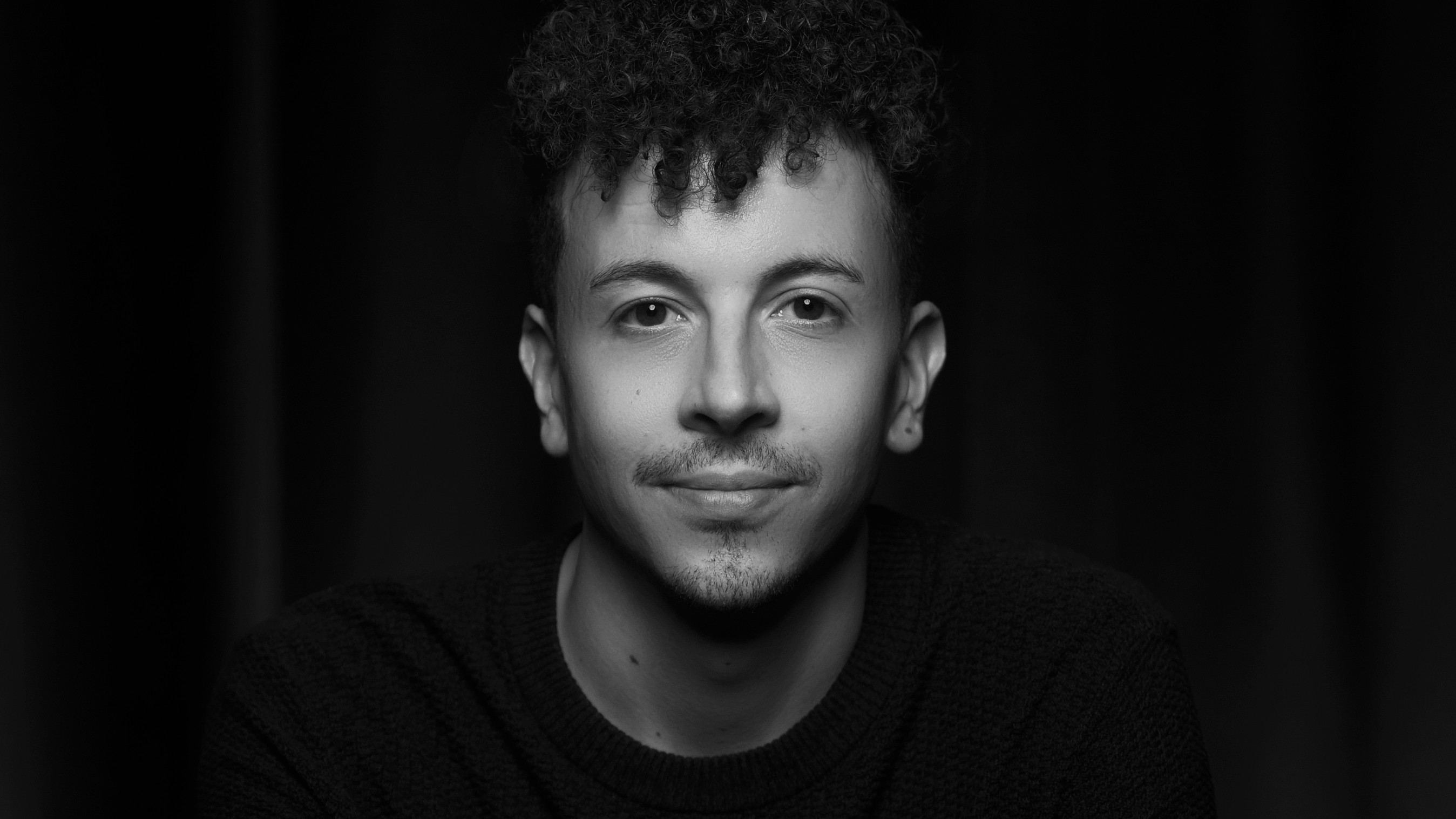
How did you find the actors in Flock?
A longtime collaborator of mine, Hannah Marie Williams, was my casting director. I always cast the same way. I always cast blind. When I’m writing, I will write: this lead farmer I’ve been thinking of is a 6-foot-2 big stocky guy who looks kind of scary. And when we go to the casting process, I want to get rid of that. I just want to see the best person for the role. Someone who turned up for the lead antagonist role was Eiry Thomas, who is a well-known face in Wales, but more people need to see her. She came in and delivered one of the strongest auditions and just instantly reinvented the role for me. I thought: “Oh, you don’t need to be physically imposing to be imposing.” She is very small, and you see that, but she has all the power.
Kenton, our lead actor, is kind of an unknown. He has done bits and bobs, but he used to be a shepherd himself. He used to work with animals, and that was a big part for me. I wanted someone who looks natural with handling sheep, and he was great to work with. But I think probably our biggest star of the film, someone you might recognize, is Fflyn Edwards, who plays The Farmhand, the boy. I think we all can agree that he has that very striking look about him. I remember when auditioning, we must have looked at 30 boys for that role, and nearly all of them hadn’t done anything. And then I had a conversation with Flfyn, asking, “So what’s the last thing you’ve done?” I was thinking he’d done a play or a school performance. And he said: “Well, I’ve just come off working on The Crown [playing young Prince Harry], and I’ve also just wrapped a film with Scarlett Johansson [My Mother’s Wedding], and I’ve also just wrapped up that Netflix series 1899.” He’s going to be a big, big name, I reckon. So, for him to be a part of this film, I was very, very grateful.
I’m a big fan of experimental sounds and music. Flock has that. Can you talk a little bit about the sound and music choices?
I could have a three-hour conversation with you about sound and music. It’s a massive element for me. It’s probably one of the things I start with. When I start coming up with an idea for a film, a big part of that is what the world is. A big part of that is what it sounds like. Atmosphere is something I really feel is integral to the type of films I want to make. So, when it comes to sound and music, I have two people I have worked with a couple of times now. One is a composer called Sion Trefor, who has been blowing up. He did that FX series Say Nothing and other amazing stuff recently.
When you come to a film like Flock, you could look at it and go, “Okay, we see a bunch of sheep, so we need to find some sheep noises and put them on.: For me, one conversation I’m always interested in when it comes to sound is, though, what do the sheep in our world sound like and how do we make that unexpected? When you look at the kind of tone and vibe I’m trying to create, it’s definitely about the synergy with music and sound.
I almost wanted people to close their eyes and listen to this film and kind of understand the tone and the themes that we’re trying to explore. It’s very much the idea of wanting to create a very impressive, very stark ambience and an atmosphere.
One of the things I have in my collaboration with Sion is I like having music well before even shooting. I like starting to understand what the world is. I’ve had moments where I played original music from Sion to our actors, so they understand the world. Filmmaking is not just a linear process for me. Music can be played to the actors so they understand the type of world you’re trying to create, so it’s all intertwined.
Do you know what you will be doing next?
With Flock coming to the end of the journey, my entire focus is on my debut feature. That is the next thing I’ll be focusing on in the next couple of months, because I know that’s going to be a big process. I’ve got a meeting with some of my producers to talk about two or three ideas that are close to my heart and that I feel could be an evolution of what Flock is in terms of the themes and the world, and the style.
The biggest thing for me coming away from Flock was that I’m really confident and understand the types of films I want to make. I know a feature film is a big process. That could be a five-year journey, so I want to get it right. So, hopefully the next thing you’ll see from me will be a debut feature that’s equally as ambitious, equally as dark and challenging as Flock, but hopefully also has some commentary on the beauty of humanity in some way.
For more LFF 2025 shorts coverage, check out:
‘Magid / Zafar’ Writer-Director Luís Hindman Sets the Beat to Explore South Asian Masculinity

